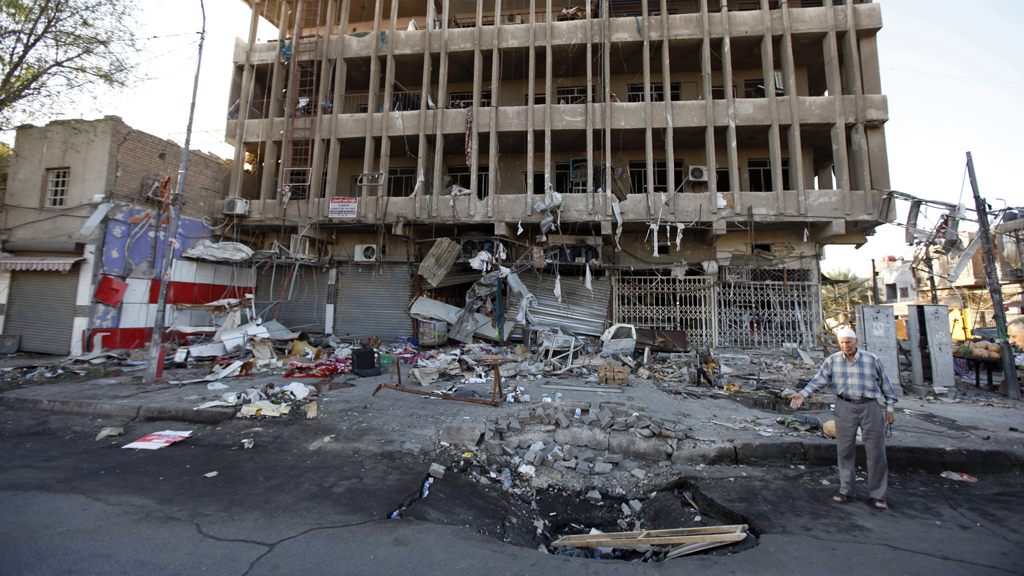Bomb attacks in Baghdad as US sends more military to Iraq
A suicide bomber attacks a checkpoint near the home of new Iraqi prime minister designate Haider al-Abadi, as he begins his efforts to unite the country against jihadi militants.

Police sources and local media said the bomber blew himself up at the checkpoint that leads to Mr al-Abadi’s home on Tuesday, causing severe damage. There was no word on casualties.
At least 17 people were killed in two car bombings in Shia areas of Baghdad on Tuesday morning.
Mr al-Abadi, being brought in to replace the divisive Nouri al-Maliki, has won support from Iran and the United States as he called on Iraq’s political leaders to end feuding and unite against Islamic State. Sunni neighbours Turkey and Saudi Arabia also welcomed Mr al-Abadi’s appointment.
Mr al-Abadi’s Shia predecessor was seen to have alienated the Sunni community – leading some parts of the Iraqi population to support the advance of the Islamic State through large swathes of the country’s centre and north.
International support has been focused on helping thousands of people driven from their homes by the Islamic State, including members of the minority Yazidi community which has been trapped on Mount Sinjar by the group. Some of the Yazidis have now escaped to a refugee camp in Kurdish Syria.
Watch: Foreign Affairs Correspondent Jonathan Rugman's dramatic footage from a helicopter rescue at Mount Sinjar
The United States authorised sending a further 130 military personnel to Iraq on Tuesday. A statement from the Pentagon said the soldiers will develop options for helping civilians trapped on the mountain.
The European Union gave the go ahead for individual members to supply weapons to Kurdish forces in coordination with Baghdad. Diplomats said France, Italy and the Czech Republic were among the countries in favour of supplying arms. There was no immediate indication that arms will be provided soon.
Read more: International Editor Lindsey Hilsum on who is on whose side in Syria and Iraq
Australia’s Prime Minister Tony Abbott has said he would not rule out sending armed forces to fight Islamic State militants.
On Tuesday British Royal Air Force Tornados arrived in Cyprus (video, below) ahead of humanitarian missions to northern Iraq. Prime Minister David Cameron is coming under increasing pressure to support addressing the issue of Iraq’s humanitarian crisis and the advance of Islamic State.
The government has since stepped up its involvement, saying a “small number” of RAF Chinook helicopters will also be sent to the area.
On Wednesday, International Development Secretary Justine Greening confirmed that a third round of successful UK air drops had taken place.
The supplies included two C130 consignments containing 2,640 reusable water purification containers filled with clean water and more than 500 shelter kits to provide shade in temperatures of more than 40C (104F). There have now been five successful drops over three nights.
However, David Cameron has insisted the UK will not intervene militarily – despite calls from experienced commanders on Tuesday for the UK to join the US in airstrikes.
-
Latest news
-
‘Government responsiveness should be improved’ says infected blood inquiry chair4m

-
Infected Blood scandal: How UK failed on a global scale4m

-
‘There’s a strong evidential basis’ for ICC to grant arrest warrants for Netanyahu, says criminal law expert4m

-
International Criminal Court prosecutor seeks arrest warrants for Israel PM and Hamas leaders3m

-
‘Highly unlikely there was foul play’ in Iran president helicopter crash, says Tehran professor5m

-




